Top business leaders lead with stories
A chapter closed on my life on Friday, January 12, 2018.
After five years as the professor of storytelling, creating and teaching the communications curriculum for the Executive Masters of Sustainability Leadership program at Arizona State University, I passed the quill to a new instructor.
We graduated our fourth cohort that afternoon. During the celebration, I got to share my thanks with our graduates and say goodbye to a program that made a tremendous impact on me.
I started by introducing them to an ancient mystic by the name of Nasrudin. They say he was both brilliant and foolish.
But I kept stumbling over the pronunciation of his name, so I changed it to George.
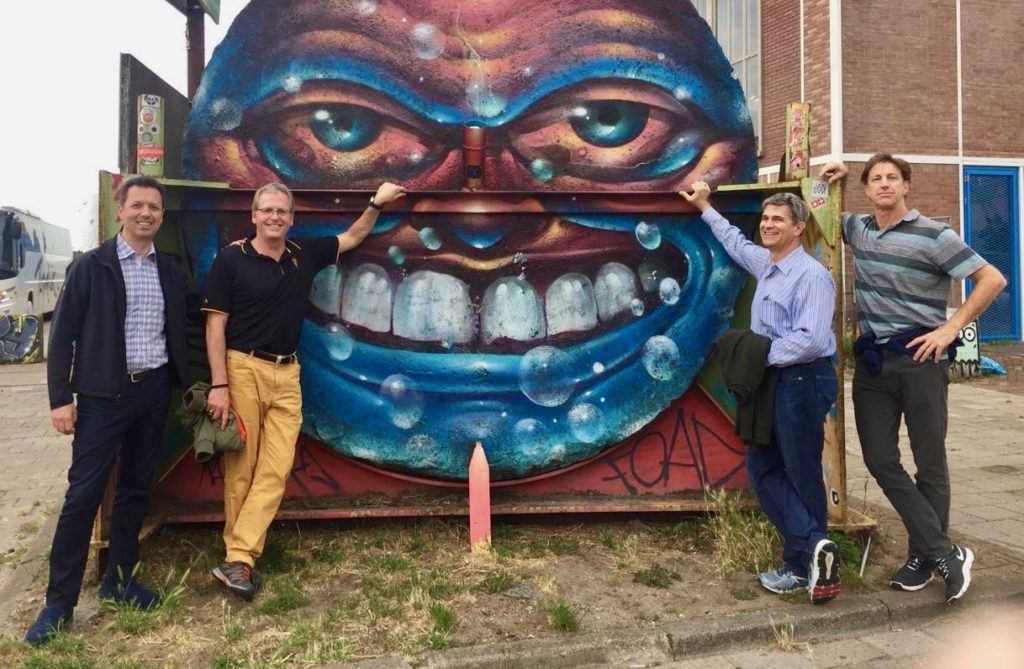 Our students laughed because Dr. George Basile (far right) is one of the three amazing professors I had the honor of teaching with for EMSL.
Our students laughed because Dr. George Basile (far right) is one of the three amazing professors I had the honor of teaching with for EMSL.
Like Nasrudin, George is brilliant, a Ph.D. Biophysicist. And foolish in all of the best ways. Picture a tall, SoCal beach volleyball-playing dude (although he was a member of the prestigious Berkeley rowing crew) combined with the marketing smarts of David Ogilvy and the delivery of a caffeinated stand-up comic, and you’ve got George.
Happiness found in storytelling
“A seeker of George had looked for him for many years to ask him a question that burned in her heart,” I continued.
She found him in a Marrakesch market sitting atop a pile of banana peels.
“Such is the dichotomy of life,” I mentioned to our students. “It’s essential that seriousness and foolishness co-exist for our sanity.”
She looked up at George, who appeared to be in deep meditation. She cleared her throat to get his attention.
“Oh great sage,” said the eager student. “I must ask you a very important question, the answer to which we all seek.”
George opened his left eye and looked down at the young lady.
“What is it?” he replied.
“Tell me the secret to attaining happiness.”
George thought for a time, then responded, “The secret to happiness is good judgment.”
“Ah,” said the student. “But how do we attain good judgment?”
“From experience,” answered George.
“Yes,” said the student. “But how do we attain experience?”
“Bad judgment.”
The class laughed enjoying this unexpected tale.
Make your stories retellable
I used the story to create a moment in time that I hope they won’t soon forget. And I tied the tale to their EMSL journey to make it as relevant to each one of them as possible.
I reminded them of the good judgment they demonstrated when they registered for the 12-month executive master’s program, investing their hard-earned money and scarce time to elevate their leadership skills and differentiate their personal brands through the lens of sustainability.
They all grinned and nodded in agreement.
Then I reminded them of the highs and lows they experienced in the course.
“How many times did you feel like this was a mistake? Or that you weren’t good enough? Or that you wanted to quit?” I asked. Most again nodded in agreement.
“And what about the times when you had to re-do a paper or an assignment because your judgment wasn’t as clear as it needed to be?” A few shared knowing smiles with me.
“But all of that good and bad judgment has created a transformative experience for you that has changed the course of your life, which will change the course of other lives because of your dedication to social causes and the environment. And here you are on one of the happiest days of your life…graduation,” I said.
I closed by thanking them for investing in themselves and sharing their life with me as their sustainable storytelling instructor. And I acknowledged how much I have learned from them and how EMSL has transformed me as a human being as well.
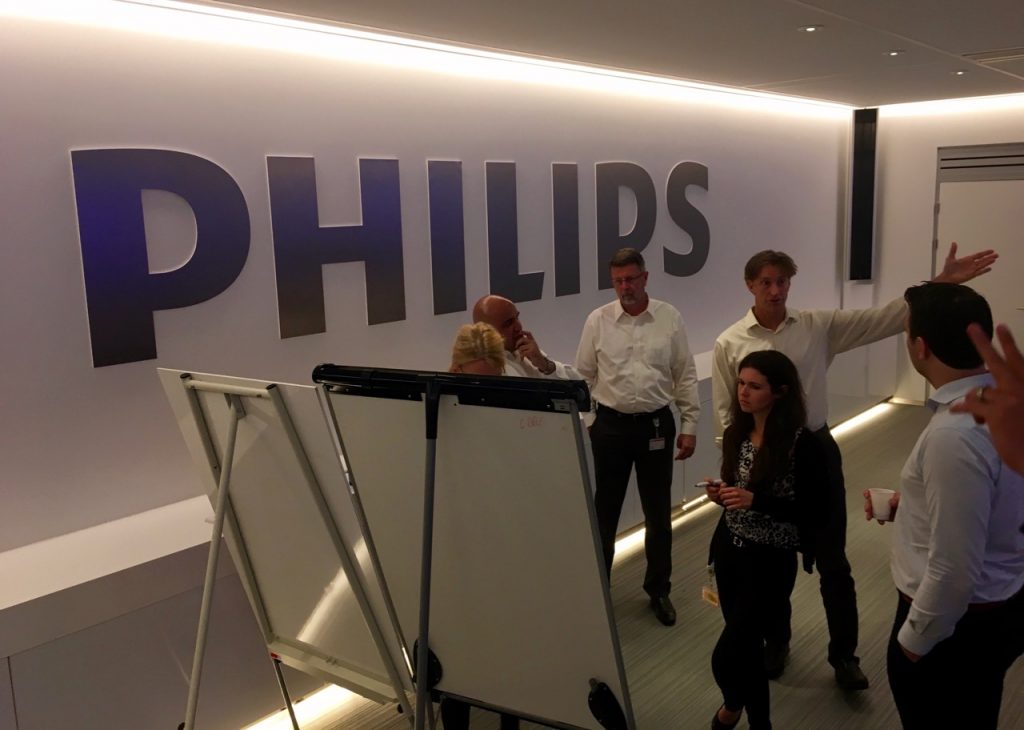
I learned that culture is more powerful than compliance to change behavior. This was underscored to me while our students worked onsite with Philips Electronics in Eindhoven, NL, to help them create a more sustainable supply chain. Rhetoric and assertions are the communication techniques many leaders use to try to make people comply. But true stories about the human impact we have on this planet are what shape our cultures and move people to action.
Another moment that changed me is when I was humbled realizing that I had complicated my course. I needed to simplify my instruction to help our students make better presentations. I was suffering from the dreaded “Curse of the Expert.” But I had expert assistance from my fellow instructors and ASU’s course designers and I grew in the process.
Our insightful leadership professor, Dr. Kevin Gazarra of Magna Leadership, taught me about servant leadership and how to help our students understand and apply what I had to teach.
Russell Goldstein, one of our recent grads, showed me his recent speaker evaluations following a presentation, and his high marks brought a beer to my eye. How his audience reacted to Russ and his stories was proof to me that what I was learning about being a better professor was translating over to our students.
I also witnessed the power of teamwork on a purpose-driven mission when Bruno Sarda, now the President of North America for CDP (Carbon Disclosure Project), and Dr. Basile – the two visionaries who designed our EMSL program – came to me one November day in 2012 and asked if I was interested in creating the communications curriculum. Their vision for launching a pioneering masters program in sustainability at the largest university in the country was frightening but exhilarating.
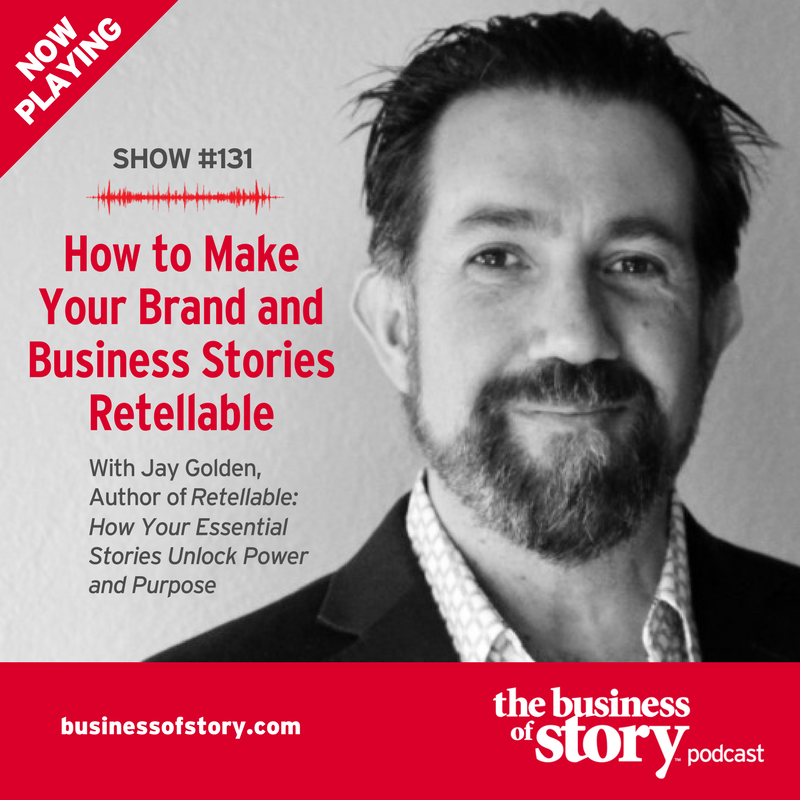 Together, with a dedicated staff, we created a transformative leadership program for everyone it touches including students, global brands, administrators, our families and the communities we serve.
Together, with a dedicated staff, we created a transformative leadership program for everyone it touches including students, global brands, administrators, our families and the communities we serve.
All pretty heady stuff. So I wanted to bring this meaningful moment for our students back down to earth. That’s why I couched my closing remarks in the story of Nasrudin/George: to make this scene poignant and memorable for our students.
I pulled Nasrudin’s story from the pages of Jay Golden’s wonderful new book, Retellable: How Your Essential Stories Unlock Power and Purpose. Of all the stories he shares in his book, this parable made me laugh. I couldn’t forget it.
You can hear from Jay on how to make your stories memorable and retellable on the Business of Story podcast.
Stories say more about you than your credentials
Now contrast this moment with the requests I often receive from prospective guests who want to be on my Business of Story podcast. They come at me spouting their positions, opinions and assertions about the importance of telling stories in business and brand storytelling, but they rarely start with a story or share one of their own.
Ironic, yes?
Here’s an example of a request I received yesterday:
Park,
I believe that businesses – and their marketing departments – can do better in telling stories. Making the client the hero and guiding them through the journey is a pretty common way to st
art this journey. It’s not new. However, I believe in the power of using the right language, the right medium and the right feel to the tell the best story.
What I love so much about story is that we all have a different one. I love to hear other people’s stories and to help tell them where possible. For a business, it’s not easy to simply make a huge change. From a tactical perspective, helping professionals see how to take small steps (telling stories visually on Instagram, showing authenticity on Twitter, using video in new ways) helps shift the way they do things.
Finally, I believe we, as storytellers, can and should take inspiration from everywhere. Song, art, books, poetry, speeches … and we can use them to connect on a deeper level in so many ways. I may not be the best storyteller – but I sure believe in using the craft to connect with an audience.
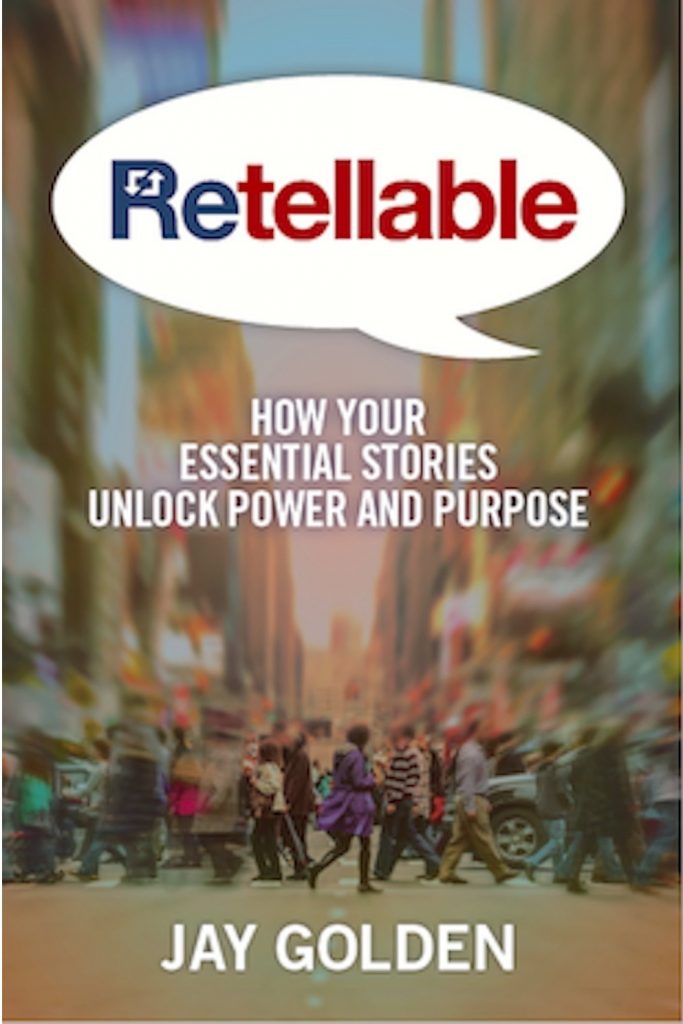
This is the problem with business storytelling. Everyone thinks they’re good storytellers, lots of people jumping on the storytelling bandwagon. But they don’t tell stories. They just tell you how important stories are in your work.
That’s like me telling you how important it is to gas up your spaceship with only the best fuels and eat only brain-healthy foods. Now I’m no rocket surgeon, but I can give you my empty opinions on the subjects all day long. Unless I support my assertions through true stories about my experiences that you cannot refute because they actually happened to me, then I am using bad judgment in how I choose to communicate as a leader.
Through my stories, I’ve learned that experience creates beliefs that lead to truths. You believe what you experience, and within those experiences, you’ll find the truth as you know it. Everything else is opinion and judgment.
And what do you experience with the bad judgment of not using stories to illustrate your expertise? Audiences will argue your points. Defend their positions. Makeup anti-stories about you and your knowledge.
They will disconnect.
Your leadership becomes listless. Your presentations become mundane. Commoditized. Unremarkable. Unmemorable.
Un-retellable.
Stories will sustain you. They’re hard. But so worth the effort.
I responded to the gentleman who sent me the above request with the story of Nasrudin from Golden’s book. I used the tale to underscore the good judgment found in leading with a story, especially if you’re professing yourself as a business storytelling expert. I asked him to share a story with me that demonstrates his ability as a business storyteller, something that would be of value to our listeners.
I’ll let you know what I hear back.
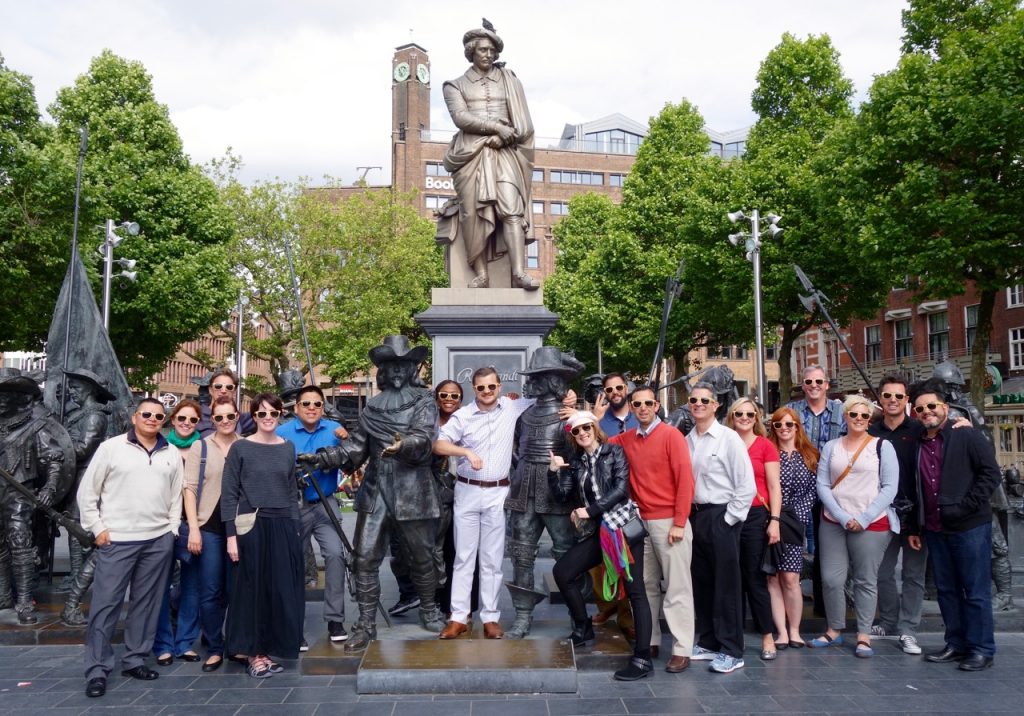
Our intrepid Executive Masters of Sustainability Leadership students in Rembrandt Square, Amsterdam, June 2016
I coach my students that as newly-minted sustainability leaders to lead with stories. Their diploma and credentials are the cost of entry into this rapidly expanding industry. But it’s their true stories well told of what they have experienced and learned in the process – from good judgment and bad – that will connect with people to move them to action.
How do you attain success in your purpose-driven pursuits that’ll make you happy? You’d be wise to share your experiences, beliefs and truths through stories.
Story on, my friend!


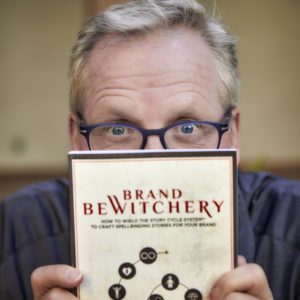
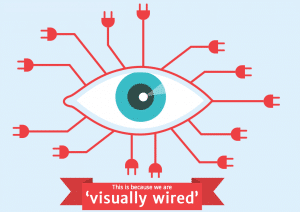


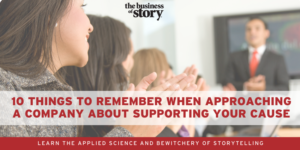





at 2:25 pm
[…] social media to weave yarns and tell stories that hook and captivate their customers. In turn, these stories serve to spread a brand’s reach and boost engagement with their […]